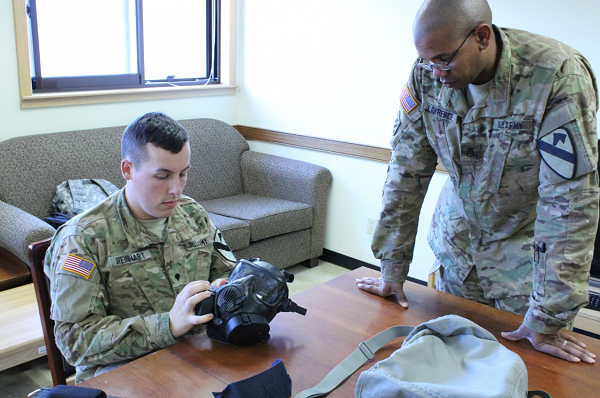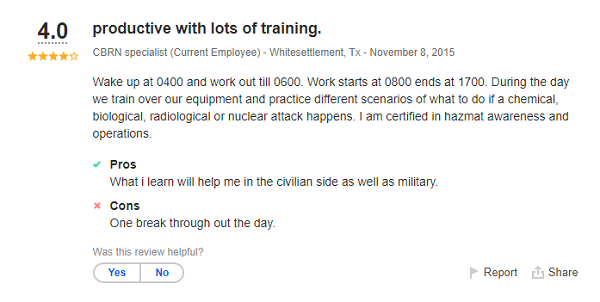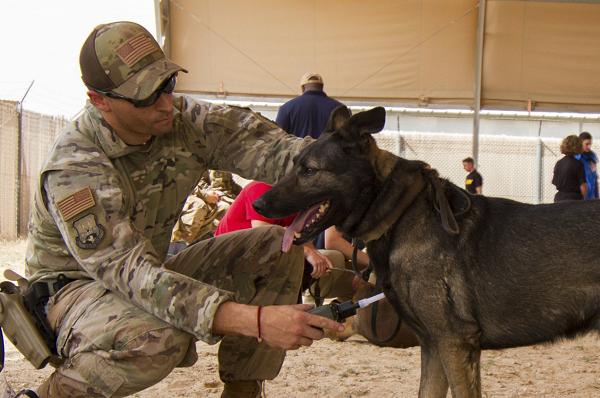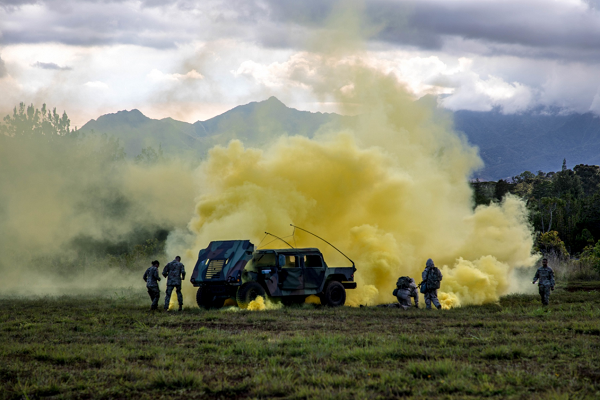Army CBRN Specialists (MOS 74D) defend the country against Chemical, Biological, Radiological, and Nuclear (CBRN) weapons and Weapons of Mass Destruction.
The specialist in this Army MOS provides detection and response to CBRN weapons.
These highly trained specialists train Army personnel on attack response and operations.
Qualifications and Training
To enter into this MOS, individuals must take and receive a qualifying score on the ASVAB at the nearest MEPS center.
This MOS requires a minimum score of 100 on the Skilled Technical (ST) portion of the ASVAB test.
Once all testing is complete, recruits will go to Basic Combat Training for 10 weeks.
After Basic Combat Training soldiers will go to Advanced Individual Training for 11 weeks.
During training, soldiers will earn their Hazardous Material Certification.
Training is a combination of hands-on and classroom training where soldiers learn how to prepare CBRN defense actions and procedures.
Skills that are helpful in this MOS:
- Effective Communication
- Ability to work in high-stress situations
- Organized
- Interest in a job involving algebra, physics, trigonometry, geometry, and chemistry
Related Article: Army Psychological Operations Specialist (MOS 37F): Career Details
What are the Job Duties of a CBRN Specialist?

Chemical, Biological, Radiological, and Nuclear Specialists are trained to protect and defend against CBRN threats and Weapons of Mass Destruction.
There are many countries that have nuclear weapons, and CBRN threats are a reality that the Army is prepared to react to.
Response to CBRN threats must be swift and efficient because a CBRN attack can be lethal and disable targets quickly.
CBRN Specialists study three areas: chemical, non-chemical, or decontamination.
Specific job duties will vary based on the area that they are assigned.
Training
Not only do they complete advanced training and continued training, but soldiers in this MOS also train other military personnel.
They will train both military and civilians on what to do in the event of a CBRN attack.
CBRN Specialists must be familiar with the proper use of protective equipment and know how to put it on within seconds.
They also provide training advice to company and higher-level organizations.
Specialists supervise any use of CBRN equipment and operations.
During training events, a specialist may be exposed to toxic agents while wearing CBRN protective equipment.
When conducting training, they will also simulate toxic agents to train other military personnel on response.
Military Working Dogs are an important part of the military and are at risk in the event of a CBRN attack.
CBRN specialists can also train the Military Working Dogs and their handlers on how to identify risks and mitigate them.
Equipment
CBRN Specialists will both operate and maintain CBRN decontamination, defense, detection, and monitoring equipment.
Soldiers will use radiological detection devices in the field and during decontamination operations.
They use the Biological Integrated Detection System to detect biological agents.
One of the tools that they use is a small Joint Chemical Agent Detector (JCAD) which makes different sounds when detecting.
Another piece of equipment that is important to soldiers is their M50 Field Protective Joint Service General Purpose Mask.
This piece of personal protective equipment should be readily available in the event of an attack to provide protection to the soldier.
During reconnaissance, soldiers may use the Fox Recon vehicle or Stryker Armored Combat vehicle.
These vehicles allow soldiers to detect chemicals outside of the vehicle while minimizing exposure.
The vehicles can take samples, identify areas of contamination, assist with decontamination, and provide data to the personnel inside.
Related Article: Army EOD (MOS 89D): Career Details
Job Duties
These Specialists must assist in the establishment of CBRN defense measures, including serving on various teams and units.
Teams that they may serve on include Biological Integrated Detection Teams, STRYKER NBC Reconnaissance Platoons, Special Forces, Ranger Units, and Technical Escort Battalions.
At times, they may be required to assist in creating new standard operating procedures or manuals on new techniques, equipment, or training.
Using equipment and training, the specialist will conduct CBRN reconnaissance, surveillance, and obscurations operations.
They may perform CBRN-sensitive site exploitation.
Soldiers are Hazardous Chemical Certified and will transport or destroy chemicals.
When responding to an incident, specialists first find the leak, exposure, or type of CBRN, and then if there are people around, they will work on evacuating the people to safety.
During a CBRN exposure or attack, soldiers may provide first aid and are required to know how to perform first aid specific to the CBRN injury.
After training or after an attack, their job will be to perform decontamination operations on people and equipment.
This position requires soldiers to write reports and log any information that they can regarding an incident.
The Army video below can be viewed for more information on CBRN Specialist job functions.
What Does a CBRN Specialist get Paid?
CBRN Specialists will get paid based on rank and time of service.
This position is entry-level and with no prior military experience, soldiers can expect to make an estimated $23,000 a year in base income.
This amount will vary during and after training.
The Army offers recruiting bonuses for in-demand jobs, with in-demand jobs changing based on Army needs.
CBRN Specialist is currently considered an in-demand job, and recruits can earn up to a $20,000 enlistment bonus.
Other bonus opportunities include expedited training shipping.
Follow the table below for Army ranks and pay.
| Insignia | Pay Grade | Rank | Abbreviation | Minimum Monthly Pay |
|---|---|---|---|---|
| E-1 +4 months | Private | PVT | $1,917.60 | |
| E-2 | Private Second Class | PV2 | $2,149.20 | |
| E-3 | Private First Class | PFC | $2,259.90 | |
| E-4 | Specialist | SPC | $2,503.50 | |
| E-4 | Corporal | CPL | $2,503.50 | |
| E-5 | Sergeant | SGT | $2,730.30 | |
| E-6 | Staff Sergeant | SSG | $2,980.50 | |
| E-7 | Sergeant First Class | SFC | $3,445.80 | |
| E-8 | Master Sergeant | MSG | $4,957.20 | |
| E-8 | First Sergeant | 1SG | $4,957.20 | |
| E-9 | Sergeant Major | SGM | $6,055.50 | |
| E-9 | Command Sergeant Major | CSM | $6,055.50 | |
| E-9 | Sergeant Major of the Army | SMA | $6,055.50 |
Related Article: Military Intel, Systems Maintainer (35T): Career Details
Benefits
In addition to the base pay and bonus opportunities above, the Army provides special pay and benefits.
Special pay opportunities are available in situations such as deployment.
Army benefits:
- Paid housing and food
- Tuition Assistance
- Medical and Dental
- Paid sick time
- 30 days paid vacation a year
- Low-cost life insurance
Job Reviews
Reviews of the position state that it is fast-paced and training is in-depth.
When soldiers are not deployed, the majority of their time is focused on training.
Positive aspects of this position include the working environment and skills that are transferable to civilian work.
Negative reviews discuss the need for more breaks.
The overall rating for this position based on reviews was 4.4, with the least appealing portion of the position being the work/life balance.
The review below provides a daily routine for the position as well as pros/cons of the position.

The Army video below provides an inside look at CBRN Specialists.
Related Article: Army Utilities Equipment Repairer (MOS 91C): Career Details
Civilian Career Opportunities
Working as a CBRN Specialist provides experience with hazardous chemicals that can be used in the civilian employment sector.
Soldiers can find positions as Chemical Technicians, Hazardous Materials Removal Workers, or Nuclear Monitoring Technicians.
This MOS teaches soldiers about safety and response.
Positions as Emergency Management Directors, Fire Fighting Prevention, Fire Fighters, Occupational and Health, and Safety Specialists are available.
CBRN Specialists have opportunities to complete advanced training that rewards credentials in areas of safety and hazardous materials handling.
These credentials assist with promotion points and civilian career opportunities.
Summary

Army CBRN Specialists (MOS 74D) are the highly trained men and women who are prepared against Chemical, Biological, Radiological, and Nuclear attacks.
This specialty requires soldiers to be prepared and be knowledgeable enough to prepare others in response to an attack.
CBRN Specialist is an entry-level position that requires ASVAB testing to enter into the position.
Soldiers can expect to be paid based on rank and time of service and may qualify for recruiting bonuses.
Reviews of this position are positive, with most soldiers recommending the position.
The training and skills provided in this MOS allow for civilian career opportunities surrounding hazardous chemicals and safety preparedness.
Related Article: Army Allied Trade Specialist (MOS 91E): Career Details
References
- 68 Series MOS: A List of Medical Field Jobs in the Army - June 19, 2024
- 15 Series MOS: US Army Aviation Jobs - June 19, 2024
- 11 General Orders For Each Military Branch - June 19, 2024
General FAQ
What is a 74D CBRN specialist in the Army?
An Army CBRN Specialist (MOS 74D) trains and works to defend against Chemical, Biological, Radiological, and Nuclear Weapons. They detect and respond to CBRN attacks.
How long is AIT for CBRN?
After Basic, an Army CBRN Specialist will train for 11 weeks at Fort Leonard Wood, Missouri. This facility is the primary location for CBRN operations training for the U.S. Army.
How do I join the CBRN?
Along with other physical and educational requirements, to become an Army CBRN Specialist, you’ll need to score 100 or better on the Skilled Technical portion of the ASVAB.
What civilian jobs can an Army CBRN Specialist qualify for?
An Army CBRN Specialist may find a position in emergency management, firefighting, or occupational health and safety fields after separation from the service.
How much does an Army CBRN Specialist make?
The Army pays according to rank and time in service, so a new recruit can expect to make about $23,000 per year to start, along with benefits. In-demand fields like CBRN may also come with an enlistment bonus.

